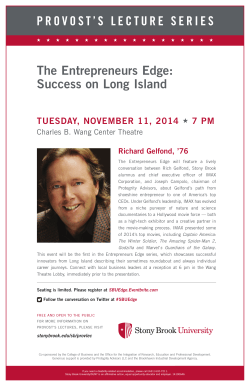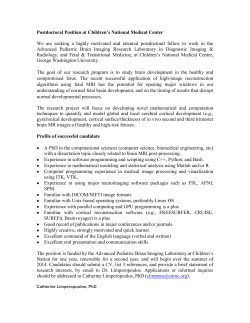
SAMPLE PREPARATION AND THERMOMECHANICAL CHARACTERIZATION Thin Film Processing Thermomechanical Characterization
SAMPLE PREPARATION AND THERMOMECHANICAL CHARACTERIZATION Thin Film Processing • 6-ft. chemical fume hood • Photoresist spinner • Oil-trapped vacuum oven • Ellipsometer Thermomechanical Characterization • Thermal Gravimetric Analysis (TGA, TA Q50): Temp. range: ambient+5~1000°C • Differential Scanning Calorimetry (DSC, TA Q2000): Temp. range: -90~550°C • Dynamic Mechanical Analysis (DMA, TA Q800): Temp. range: -145~600°C • Thermal Conductivity Meter (DTC-300): Temp. range: -20~300°C; Thermal conductivity range: 0.1~40 W/m.K FEES FOR SERVICE (As of June 2013) Fees are subject to change without notice; internal rate is applied to users or PIs affiliated with Stony Brook University faculty positions. Use of Facility Internal: $69/hour External: $98/hour Sample Preparation Internal: $68/hour External: $96/hour ThINC is a core facility of the Advanced Energy Research and Technology Center (AERTC). It is dedicated to establishing partnerships between Stony Brook University and industrial laboratories for enabling cutting-edge research in nanoscience. CONTACT US Advanced Energy Research and Technology Center (AERTC) 1000 Innovation Road, Stony Brook, NY 11794-6044 Dr. Miriam Rafailovich Chief Scientist, AERTC Distinguished Professor, Department of Materials Science Co-Director, Program in Chemical and Molecular Engineering miriam.rafailovich@stonybrook.edu 516.458.9011 Stony Brook University/SUNY is an affirmative action, equal opportunity educator and employer. 14090409 Dr. Chung-Chueh Chang Instrumentation Scientist chung-chueh.chang@stonybrook.edu 631.216.7412 We are a new comprehensive core for multiscale characterization and imaging, with facilities for sample preparation, imaging and thermo-mechanical characterization. We have PhD scientists ready to run your samples and provide guidance in choosing the Dr. Ying Liu Industrial Project Scientist ying.liu.1@stonybrook.edu 631.216.7412 best solutions for your materials-related problems. aertc.org November 2014 SCANNING PROBE MICROSCOPE WITH HYSITRON ATTACHMENT TRANSMISSION ELECTRON MICROSCOPE (TEM) Bruker Dimension ICON JEOL JEM 1400 • Nanomechanics/nanoindentation • Suitable for materials science, polymer and biological applications • Nanoelectrical characterization • Imaging in fluid • Features available: Cryotomography, STEM, EDS for elemental identification • Heating and cooling stages • Contact, Tapping and ScanAsyst modes Scanning probe microscope images: (left) 3D image of photoresistimprinted patterns on silicon wafer scanning by Contact mode; 2D image of organic photovoltaic polymeric solar cell (PMMA/ P3HT/ PCBM) scanning by PeakForce TUNA mode, showing the topography (middle) and conductive current (right) measurement • Accel. Vol.: 40~120 kV • Magnification: x5,000~2,000,000/ x120~4,000 TEM images: (top) Graphitized carbon, showing a distance between graphene layers of approximately 3.4Å; (middle) Synthesized gold nanoparticles, with average size ~40 nm; (bottom) P3HT/PCDTBT blend polymer thin film UPRIGHT CONFOCAL MICROSCOPE Leica TCS SP8 X • Upright geometry suitable for materials science applications with opaque samples or substrates • Immersion lenses permit imaging of submerged samples EM SAMPLE PREPARATION • GaAsP hybrid detection system (HyD) • High-quality ultramicrotome for precise room temperature and cryo sectioning (-15~ -185˚C) • White light laser 470~670 nm, and UV laser 405 nm • Tokai Hit stage incubator providing 37°C and 5% CO2 (live cell imaging) Confocal microscope images: (left) Organic photovoltaic polymer MEH-PPV electrospun fibers; (middle) Dental pulp stem cells grown on polyisoprene (PI) thin film treated with micro-sized beads taken together by incident (fluorescence) and transmitted (DIC) lights. Stained with Alex Flour Phalloidin 488 (actin filaments) and DAPI (nuclei); (right) Organic photovoltaic polymer P3HT blended with PMMA Leica EM UC7 with Cryo Attachment • Prepare excellent quality semi- and ultra-thin sections, as well as the perfectly smooth surfaces for light, electron and atomic force microscopy examination • Diamond and glass knives available • Ideal for elastomers, polymers, organic photovoltaics • Well suited for biological samples, either embedded or lyophilized AMG EVOS FL MICROSCOPY SPECTROSCOPIC ELLIPSOMETRY • Light Cubes: DAPI (Ex 360/ Em 447 nm) GFP (Ex 470/ Em 525 nm) White (non-transparent samples) Horiba UVISEL FUV • With monochrome camera, it can capture images at 16-bit monochrome TIFF or PNG; 24-bit color TIFF or PNG; JPEG or BMP (1280 x 960 pixels) • Nanometer film thickness determination with multifilm and interface capabilities • Equipped with Bioptechs stage temperature controller providing 37˚C for live cell observation • Optical constant (refractive index n, extinction coefficient k) measurements for isotropic and anisotropic films • Spectral range from 190 to 880 nm; thin film thickness from 1Å to > 30 μm • Transparent samples with backside reflections are eligible
© Copyright 2025





















